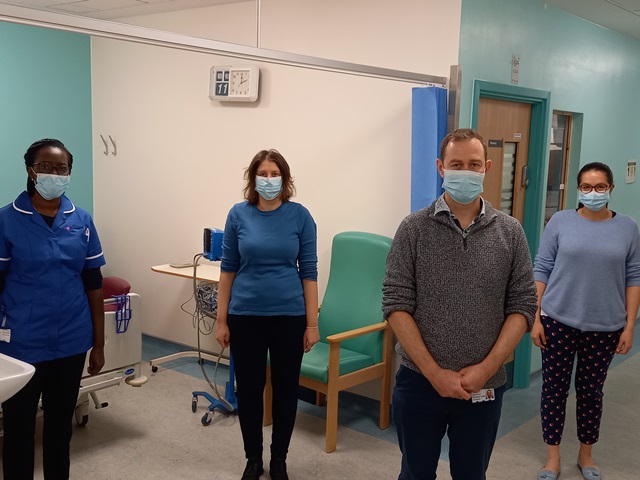
Researchers at the Royal Free Hospital (RFH) have put a call out for north Londoners who have recently tested positive for COVID-19 or are awaiting a test, to take part in a trial of two antiviral drugs to establish if they stop the virus replicating.
The FLARE trial aims to see if licensed drugs favipiravir and lopinavir/ritonavir, alone or in combination, can inhibit viral replication in early infection - within the first few days of illness.
Researchers are aiming to recruit up to 240 adults aged 18 to 70 to the randomised placebo controlled trial and participants will take oral medication (tablets) for seven days.
Trial lead, Dr David Lowe from the UCL Institute of Immunity & Transplantation and the RFH, said: “This trial will test whether favipiravir, on its own or in combination with another antiviral drug lopinavir/ritonavir, can reduce the level of the virus in people with early COVID-19 disease.
“To maximise the potential benefit, we are treating patients with very early onset infection and are looking for the additional or combined effects of adding a second drug. We want to hear from people as soon as they develop the symptoms of COVID-19, even if they haven’t had the test yet, as this is something we can arrange in tandem. The sooner we can enrol someone on the study the better – time is of the essence.
“If we can find antivirals that decrease viral load early on, this might reduce the risk of transmission and later hospitalisation.”
The study is open to members of the public who live in north London. Participants will be asked to take the study drug for a week and they are expected to be on the study for one month.
Participants who are able to safely get to the hospital, for instance in their own vehicle, can be seen in dedicated space in A&E, or alternatively the participant will be visited at home.
If you are interested in taking part in the study and would like further information please contact david.lowe7@nhs.net
The trial is funded by LifeArc and is led by UCL and run in partnership with the Royal Free Hospital, University College London Hospitals (UCLH) and Great Ormond Street Hospital NHS Trust.
The two antiviral drugs
Favipiravir works in a similar way to remdesivir and is a polymerase inhibitor, which blocks the enzyme that allows the virus to replicate its genetic material. The drug is approved for treatment of influenza in Japan.
A research paper published in the Proceedings of the National Academy of Sciences, and co-authored by one of the study investigators Professor Breuer, has also confirmed that favipiravir inhibits coronavirus in a hamster model of infection. This finding adds to the results of a small trial carried out in Japan, which found favipiravir given to COVID-19 patients with non-severe pneumonia shortened recovery time by two to three days.
Lopinavir is a protease inhibitor, which works by blocking an enzyme that processes proteins that the virus needs for growth. Lopinavir only has modest antiviral activity against SARS-CoV-2 and did not improve outcomes when given on its own to hospitalised patients with late-stage disease in the RECOVERY trial. However, FLARE is testing whether it is more effective in the early stages of COVID-19 and in combination with favipiravir.
The trial is funded by LifeArc and is led by UCL and run in partnership with the RFH, University College London Hospitals (UCLH) and Great Ormond Street Hospital NHS trusts.
If this study is successful, researchers later plan to investigate this strategy of early antiviral treatment in high-risk patients to prevent serious outcomes from the disease including hospitalisation and death.
Pic L-R: Rachel Ochiel, lead research nurse and study site co-ordinator, Maja Dabagh, clinical trial practitioner, David Lowe, consultant clinical immunologist and trial lead and Li-An Brown, infectious diseases registrar
 Translate
Translate
